#TOUCHPOINT
Explore tagged Tumblr posts
Text
Kiwi Gadbaw Keeps Fresh at the Forefront
People often train their eyes toward bright, bouncy and colorful. Gadbaw - Industrial Designer knows this very well. Much of the time, his creations stand out from the pack due to the details that cause a flash, pop or brightening of your day.
With a name like Kiwi Gadbaw it’s no wonder this man is doing extraordinarily fresh things! Clearly one who has put in his 10,000 hours – this illustrator draws from a wide variety of artistic sources. The handmade designs and drawings showcase his relentless nature to put forth a clean product and willingness to push the boundaries of traditional artistic landscapes. People often train their…

View On WordPress
#cartoons#chicago#DOUBLETAKES#fashion#fresh#GADBAW#GRAPHICTEES#japan#KIWI#LOGOFLIP#LUCKYDOG#nostalgia#ONEHANDEDCATCH#PLANETEUPHORIA#REDESIGN#remix#SEATTLE#sports#TOUCHPOINT#WASHINGTON
0 notes
Text
What is a Touchpoint - GoDigital360Degree
The magic is in the touchpoints. Elevate every interaction to build lasting loyalty. ✨
Let's define the spectrum of Digital Marketing with GoDigital360Degree ♾️
instagram
#godigital360degree#digitalmarketing#digitalmarketingagency#digitalmarketingservices#internetmarketing#digitalbranding#marketing#advertising#marketingstrategies#definition#knowledgegraph#touchpoints#touchpoint#website#webpage#branding#onlinebranding#businessgrowth#marketerlife#Instagram
0 notes
Photo

A 3-part formula to manage succession Succession is an issue commonly associated with the people in an organization who have reserved parking spots and an office with an actual door. It is a small wonder, given the drama that often ensues with even a murmur about a shift in C-Suite power.Read more... https://qz.com/a-3-part-formula-to-manage-succession-1850293823
#planning#touchpoint#successionplanning#peeragecapitalgroup#humanresources#articles#milessnadal#ecologicalsuccession#nature#business2cfinance#humanresourcemanagement#humanactivities#Miles Nadal#Quartz
0 notes
Text

You're a coward. You're afraid to stand alone.
holy fuck. Julian 'I recognize my patient has made a decision. given that it's a fucked up decision I don't want staining my hands I have resolved to go machiavellian on it it to try to change it' Bashir (SO so deeply affectionate). he went up to the space pope and looked her in the eye and called her a fucking coward to her face after mercilessly picking apart the realpolitik of the situation step by step. baby you and your dubious medical ethics are all to me.
#SUCH a characterization touchpoint omg fsdhkfa. has he ever been hotter than in righteous wroth mode#his parting 'sure i'll see you in hell' sentiment to kai winn when she tries to intimidate him.......#julian bashir#star trek#star trek ds9#ds9#poor poor kira getting kind of sidelined in this one tho. 'yeah sorry about your boyfriend. we replaced his brains with robo parts#but this isn't about you right now somehow' (her last scene with him was very good tho :'( bye bareil you sure. have been here)
268 notes
·
View notes
Text
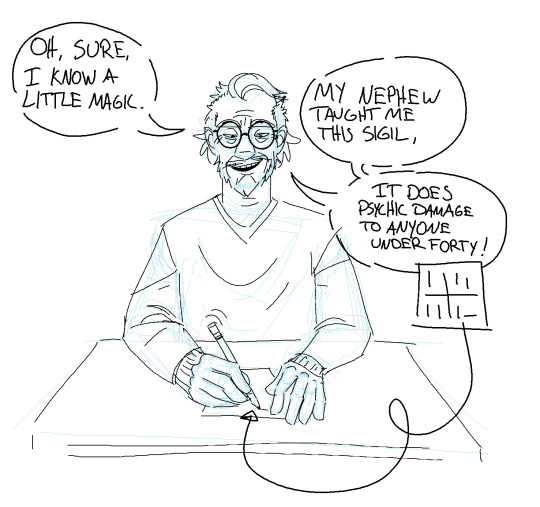
when your tabletop system of choice says that everyone knows magic by default, you gotta get creative with how your otherwise completely nonmagical guy knows anything about casting spells
#ragsycon exclusive#ragsymakes#oc kenneth#also yes i am AWARE of the alternative weird moves in place of use magic#it's just that kenny is my first motw character i get to have as a player instead of a keeper so i wanted the full flavor for my first time#canonically his late wife knew magic and she taught him some simple sigil spells#all his magic has to be written down to be cast#luz owlhouse style i guess? for lack of a more well known touchpoint
100 notes
·
View notes
Text





chainsaw man by tatsuki fujimoto // "pennsylvania furnace" by lingua ignota
#bolo liveblogs#chainsaw man#web weaving#it's been ages since I read csm but I'm cleaning out my drafts#pennsylvania furnace has a lot of touchpoints in denji's life in csm 1 actually. I could make a more elaborate post later
19 notes
·
View notes
Text
Turtles Catches Up With Old GMMTV: The Bad Buddy Rewatch Edition, Part 3a -- BBS and Asian Cultural Touchpoints
[What’s going on here? After joining Tumblr and discovering Thai BLs through KinnPorsche in 2022, I began watching GMMTV’s new offerings -- and realized that I had a lot of history to catch up on, to appreciate the more recent works that I was delving into. From tropes to BL frameworks, what we’re watching now hails from somewhere, and I’m learning about Thai BL's history through what I’m calling the Old GMMTV Challenge (OGMMTVC). Starting with recommendations from @absolutebl on their post regarding how GMMTV is correcting for its mistakes with its shows today, I’ve made an expansive list to get me through a condensed history of essential/classic/significant Thai BLs produced by GMMTV and many other BL studios. My watchlist, pasted below, lists what I’ve watched and what’s upcoming, along with the reviews I’ve written so far. Today, I offer the first half of the third (ha!) of five posts on Bad Buddy. I'll look today at themes that myself and fellow Asian fans of Bad Buddy have caught and related to in this wonderful show.]
Links to the BBS OGMMTVC Meta Series are here: part 1, part 2, part 3a, part 3b, and part 4
As a lifelong viewer of Asian dramas, and as an Asian-American myself, I know why I'm drawn to Asian dramas. We all have our reasons for belonging to this widespread fandom, whether you're watching queer or het Asian dramas, consuming Asian music, all of it.
What are my reasons? The first and foremost one is relatability. Especially in Asian dramas, I relate to the spoken and unspoken communication of the dramatic characters as they navigate life's highs and lows. I relate to the way Asian dramatic characters engage with their families, their partners, their children, their colleagues, the world and societies around them. I relate to the ways in which societies are drawn and constructed, to the economic and emotional pressures that characters face. As an American -- I don't fully relate to the majority of experiences that white American characters face dramatically, because I'm not a part of the majority. As an Asian? I get almost all of what Asians are going through in dramatic art (save for, say, Korean or Japanese historicals, ha — but I do indeed get Asian patriarchy and sexism).
I'm not queer -- I am a cishet Asian woman -- but what I appreciate about queer Asian media is, very often, the media's tendency to not be shy about the various and intricate ways that discrimination, sexism, trauma (intergenerational, emotional, etc.), and many more social and emotional phenomena interplay in an individual's life.
When I first watched Bad Buddy, I had the strong sense that what I was watching was incredibly relatable to much of my upbringing and life as a young adult, working out issues vis à vis my family and my eventual partner. Bad Buddy, thematically, captured a tremendous amount of the realities of everyday Asian life for young people.
Bad Buddy exists in the GMMTV bubble of No Homophobia (cc @bengiyo and @lurkingshan, as we have spoken about the GMMTV bubble). However, what Bad Buddy didn't shy away from were explorations of many other social/emotional/cultural themes and frameworks of everyday life, from sexism, to youth bias, to boundaries and enmeshment, and many, many more.
I wrote in my first-ever Bad Buddy thesis that the framework of intergenerational trauma was the main theme I identified -- and identified with -- in the show. But, as I was contemplating writing this series of Bad Buddy meta posts, I wanted to know: what did my fellow Asians pick up in this show that they saw, and that they related to? In other words: what makes Bad Buddy particularly special to Asian fans of the show?
So, I did a thing. I gathered together a few BBS Asian stans, like myself, for a lengthy (and still ongoing!) discussion about what we related to in Bad Buddy. I want to thank, from the bottom of my heart, @telomeke, @grapejuicegay, @recentadultburnout, @neuroticbookworm, and @lurkingshan (who's not Asian, but has Asian relatives, and gets us!) for being up for creating a spontaneous mini-village together to talk Bad Buddy and its inherent Asianness.
It sounds redundant to identify Bad Buddy, a show made by Thais and set in Thailand, as an "Asian" or "Thai" show. It's definitely not a show that steps back to take a look at itself and say, "oh hey, this is really 'Thai,' what we're doing here." When I asked @recentadultburnout directly about what they might have identified as uniquely Thai about Bad Buddy, RAB thought about it and said -- maybe Pat's ranak ek (Thai xylophone). Other shows of Aof Noppharnach's, including He's Coming To Me, Moonlight Chicken, and even the start of Last Twilight, highlight many facets of Thai life, from the spiritual to the everyday-cultural (even Gay OK Bangkok does this a bit, too). But Bad Buddy doesn't really go there by way of overt symbolism and/or specifically Thai spiritual/cultural practice.
The Asianness of Bad Buddy is far more inherent. It is rooted and coded in the way people interact with each other.
An overt example occurs in episode 10, when Dissaya confronts Ming in the Jindapat home, and announces that she will reveal Ming's secret, dropping the effort she has made her entire life to "save face" -- her reputation AND Ming's reputation.
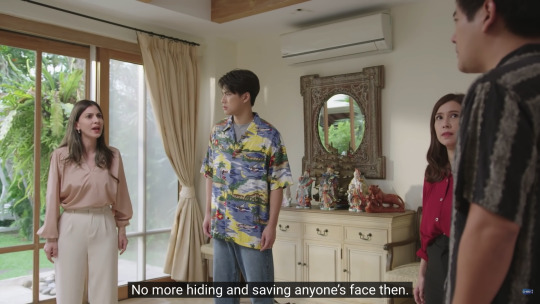
During my first Bad Buddy rewatch, I was so moved in fury by this scene that I had to blog about it as if I had never seen it before. There's so much encapsulated in this moment: the pressure that Dissaya has put on herself to keep the embarrassing secret that she lost a scholarship; the effort she made to keep Ming's theft of the scholarship a secret, to save his face, and the secrets she kept from Pran to save her face, and to keep up the façade of rivalry between the Jindapats and the Siridechawats. She was letting a whole hell of a lot loose in this moment, because the eternal pressure of saving face in Asian societies is, frankly, never-ending.
"Saving face" is an incredibly important notion in many Asian collectivist cultures. Saving face is about an individual or a family projecting an image of calm, cool collectedness and success, in order to not make waves within a collectivist society for any reason. If you are not working to seem like you are going with the flow of life, if you're not keeping up with the Joneses, the Kardashians, whoever -- you are not saving face. If you are in poverty, and are projecting an image of poverty, instead of pretending to be more wealthy than you are -- you are not saving your face or your family's face. If you allow yourself to get publicly defeated -- you are not saving face. Dissaya gave up a lot of her hard-earned reputation in the moment she confessed the truth in front of Pat and Pat's mother.
My Asian friends and I can click wordlessly into understanding the pressure of saving face; say that I didn't get good grades in school? I wouldn't be saving my parents' face. This kind of pressure to keep up with particular social dynamics within and external to family, within Asian societies, is a neverending drumbeat of pressure.
Besides saving face, there are many other Asian cultural touchpoints that were contained within Bad Buddy that my fellow Asian BBS stans and I noted. They include:
1) intergenerational/inherited trauma, 2) the unique nature of secret-keeping in Asian cultures/societies, 3) enmeshed family boundaries, 4) setting up children to compete against each other for the sake of familial pride, 5) patriarchy, sexism, and the reversal of sexism among next generations, 6) the inset/assumed roles of family members based on patriarchy and elder respect, 7) Assumed community within and external to one's family, usually based on where you live and where you go to school, 8) How one's identity is defined based on patriarchy and individualist vs. collectivist cultures, 9) How various cultures within an Asian nation live peacefully (or not) together (for example, what makes Pat and Pran different by way of Pat's Thai-Chinese heritage vs. Pran's ethnic Thai heritage),
and many, many more.
It'll be impossible, even over two posts, to analyze all of these cultural touchpoints, but a few of them engendered quite a bit of conversation among the BBS mini-village that I want to highlight. In this post, I'll focus on the continuation of my first BBS thesis on intergenerational/inherited trauma, the nature of secret-keeping in Asian societies, and will return briefly to the touchpoint of saving face.
One of the most devastating scenes for me in Bad Buddy is in my favorite episode, episode 10, when Pat (after he's learned, throughout the episode, of the extent of the lies that his and Pran's family have shared with their children) confronts his father about his father's demands to literally control Pat's emotions, the way in which Pat related to other people -- specifically Pran. Pat sums up a lifetime's worth of control in one sentence.
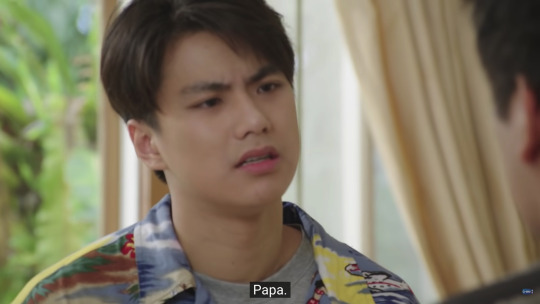
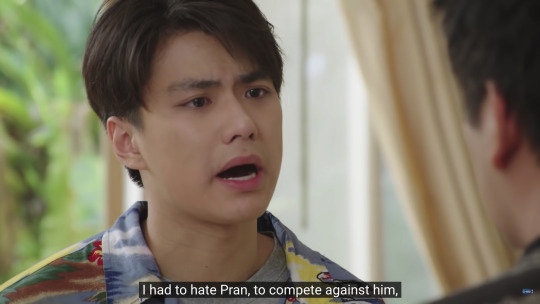
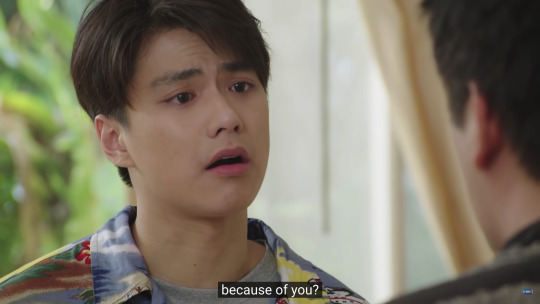
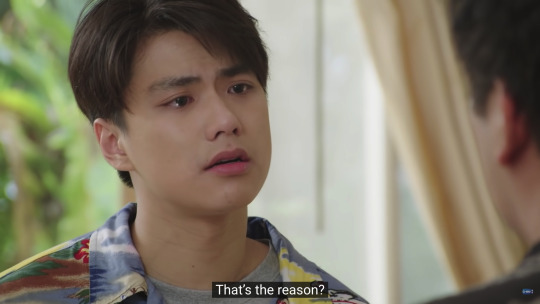
@telomeke noted in our ongoing group conversation that this notion of inherited trauma vis à vis Ming is particularly present in Asian societies, not just by way of familial expectation that we, as Asians, embody it and "take it" throughout our generations, as Pat realized up above -- but that ALL family members present are responsible for playing their roles within the framework of the inherited trauma. @telomeke noted in particular that exactly what Pat was doing to hate Pran, FOR his father? That was what Ming HAD to do for MING'S dad, when Ming schemed to get the scholarship from Dissaya. AND, Pat's mother, in consoling Pat, had to play the role of explainer -- which, as we know now, Pat ran away from to meet his beloved Pran on the rooftop before running away to the eco-village.
Pat running away from that moment? That was a huge symbol of the breaking of the inherited trauma that was given unto him by his parents both.
(@telomeke has actually written about their theory about how the Jindapats and Siridechawats ended up living next door to each other -- which seems SO STRANGE on the surface, consider Ming's and Dissaya's boiling hatred for each other -- and the theory links nicely within the framework of inherited trauma. Tel theorizes that Ming's father or grandfather may have actually gifted the house to Dissaya's family as a means of apologizing for Ming's deceit. In which case: the presence of the Siridechawats is a reminder, on an everyday basis, of Ming's folly to steal from Dissaya, which may explain why Ming in particular went so hard on Pat to triumph daily over Pran.)
We as a group unwound quite a bit on the nature of secret-keeping in Asian cultures. We know Bad Buddy relies on this cultural touchpoint at the end of the series: Pran and Pat have a full-fledged and committed relationship as a transparent secret, under the noses of Pat's and Pran's parents.
Secret-keeping....oh, man. I could not have lived a fully authentic life in America if I didn't keep a million secrets from my family while I was living out my own independent choices. I actually, literally, could not have gotten married, because the rule of my household was that I wouldn't date. I would just... get engaged. So I'd get engaged through, what, magic? Match-making? No: I'd have to find my partner through my own battle of social and familial conventions, literally against my family, to get to where I wanted to be in life, which was (gasp) married.
@neuroticbookworm illuminated more on this particularly from our shared Indian lens. She wrote,
Keeping your relationship secret from parents is sooooo ridiculously common in India (and I'm sure we can extrapolate to other Asian countries like Thailand). And the justification the children give themselves is always rooted in how they have a "duty" towards their parents, and that they will reveal their relationship after they have fulfilled their duties.
God, I LOVED that NBW brought up "duty" in this conversation. Because! Assumed within the coded language from Asian parents to children, and vice versa, is a sense that children MUST follow the dictates of their parents. 100%, full-stop.
The duties that NBW clarified in this particular conversation specified life demarcations such as "[w]hen I graduate, I'll tell my parents about my partner," and "[w]hen I graduate and get a job and can financially support myself in life, I'll tell my parents about my partner."
What's coded in these statements is a fear that the children will have to reveal to their parents that they were disobedient in the rules their parents set, that no dating shall occur until the time at which the parents rule it's okay. And at least within Indian frameworks, that period of it being "okay" is, more often than not, the period in which arranged matches are examined. Because, yes, that's still the rule in the high majority of Indian culture.
The revelation of that disobedience? That's bad-news bears. It indicates... everything: a lack of loyalty to the family; a lack of understanding the meaning of a child's role to listen to the parents as the parents are elders and therefore are the moral authority of the household; a lack of self-control (which is a huge deal -- that relates to saving face on behalf of the family); a lack of understanding the morals and ethics of saving oneself, in love and sex, before marriage, etc. Even if a family seems fully progressive on the outside, as an Asian, I'm conditioned to question that progressiveness -- as parents may hold different standards of acceptance for their children vs. other young people.
@telomeke expanded on disobedience for us -- connecting it back to the very important notion of "saving face."
I think there's something quite related to secret-keeping, but it's also to do with the ability of Asians, but also human beings in general, of being able to live with duality in life... and secret-keeping is part of it. This also ties in to the East and Southeast Asian preoccupation with the concept of "saving face" [as noted above]. A lot of families are able to live with the knowledge of dirty secrets, unsavory truths, as long as it's not brought into the light and confronted. I'm constantly reminded of this whenever I rewatch BBS Ep. 12 because it's clear both Ming and Dissaya KNOW their sons are in a relationship but it's not overtly admitted. In that way they (and more Ming I suppose) get to "save face" and not have to deal with the truth that their sons are being disobedient, consorting with the enemy, and because it's not in the open -- there is no dishonor brought to the family and to the elders.
God, I love the way Tel put this. That disobedience on the part of Pran and Pat would actually bring dishonor to their families -- because their families have put SO MUCH EFFORT into building their public AND private enmity their entire lives! It affected Chai's relationship with the families as an employee of both families. EVERYONE AT PAT'S AND PRAN'S SCHOOLS knew the guys were the "legendary rivals." And, of course, by being in rival faculties at the same university, the boys could continue this public enmity as well -- keeping up with the roles that were literally assigned to them by their parents.
If the boys disobeyed, they would bring dishonor to their families. Think about that -- and connect that with the heaviness that Pran walked away with after the rooftop kiss in episode 5, AND the weight of Pran's breakdown at the end of episode 10, when Pat assured him that they would run away together.
No matter what a Western viewer (and maybe even Asian viewers, wanting to see a dismantling of these paradigms) would want Pat and Pran to have by way of full openness of their relationships with everyone in their lives (because, in individualistic cultures, that self-driven openness is a given), Pran and Pat themselves knew that that couldn't be their reality vis à vis the social worlds they belonged to. So they kept their relationship a secret, in the end.
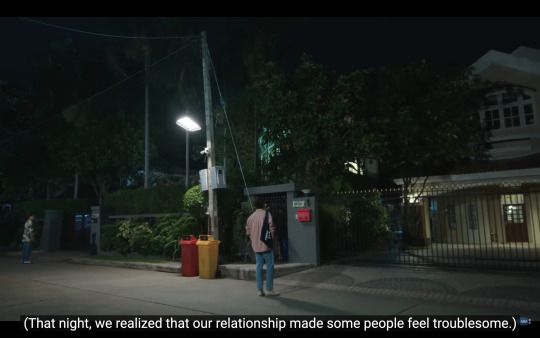
The secret that Pran and Pat keep about their relationship is strategic. It's certainly also a stress point: an older Pat asks an older Pran, at the end of episode 12, if he'll ever be able to walk through the front door of the Siridechawat house.
But this is the compromise -- within the larger-scale culture of secret-keeping in Asian societies, AND the private frameworks of the enmity that Dissaya and Ming established between themselves and their families years and years prior -- that will work best for Pat and Pran to preserve the sanctity of their relationship, which I talked about in part 2 of this meta series.
Pran and Pat do not have to publicly appear disobedient to the demands and pressures of their families. They do not have to make their families engage with each other. They do not have to make their families confront the mistakes that their parents made earlier in their lives. They can protect their families from their private and public follies. They can help their families keep and save face. And by doing all that? They can prevent their relationship from being threatened.
I feel this very deeply in my heart as an Asian-American. For the sake of my American spouse, I wanted to protect him from a lot of these pressures, and so I insisted on keeping a lot of our relationship secret from my folks. If I demanded full-blown, public acceptance from my parents? If I brought my "boyfriend" to parties, and introduced him as such with aunties and uncles -- especially if it wasn't indicated that we'd be permanent one day? Damn. No. I'd be embarrassing my folks, with the aunties and uncles saying to my folks, "dang, you can't control your daughter, huh? You let her do what she wants." That would mean my parents would lose face over their ability to control the lives of their children, and that's no bueno in our cultural terms. It would be on ME, as THEIR child, to uphold THEIR ability to save face, as much as its their own work.
Dissaya refers DIRECTLY to Pran doing this FOR HER when, in episode 10, she asks him, "did you forget to save my reputation?" It's brutal, daily work. And Pran goes BACK to keeping secrets in the end, because it would have been impossible, ultimately, for Dissaya to save face, AND for Pran to save Dissaya's reputation/face, if Pran were out with his relationship with Pat, thus proving his disobedience. It would be -- JUST -- better to keep the secret for all those involved.
As this post has gotten long, I'm going to continue talking more about these touchpoints in a second post. I'm driven to talk about this because I think much of the Western fandom might miss what us Asians are reading into shows like Bad Buddy through this coded language and engagement. I very much posit that Bad Buddy -- while it is first and foremost a queer show, made by queer Asians, about queer young men -- is so relatable to so many of us because we've faced similar struggles of survival, and we've faced threats to the sanctity of the love we have for other people by way of needed to fit into the roles set before us by previous generations.
So! With that, thank you for reading, and see you tomorrow, when I focus on competition, enmeshed family boundaries, patriarchy and sexism in Bad Buddy, and more if I can fit it in!
(Tagging @dribs-and-drabbles, @solitaryandwandering, and @wen-kexing-apologist by request! If you'd like to be tagged, please let me know!)
[Alright! Stay tuned for more, many more ruminations from the BBS Asian station tomorrow!
Here's the status of the Old GMMTV Challenge watchlist. Tumblr's web editor loves to jack with this list, so mosey on over to this link for the very latest version!
1) The Love of Siam (2007) (movie) (review here) 2) My Bromance (2014) (movie) (review here) 3) Love Sick and Love Sick 2 (2014 and 2015) (review here) 4) Gay OK Bangkok Season 1 (2016) (a non-BL queer series directed by Jojo Tichakorn and written by Aof Noppharnach) (review here) 5) Make It Right (2016) (review here) 6) SOTUS (2016-2017) (review here) 7) Gay OK Bangkok Season 2 (2017) (a non-BL queer series directed by Jojo Tichakorn and written by Aof Noppharnach) (review here) 8) Make It Right 2 (2017) (review here) 9) Together With Me (2017) (review here) 10) SOTUS S/Our Skyy x SOTUS (2017-2018) (review here) 11) Love By Chance (2018) (review here) 12) Kiss Me Again: PeteKao cuts (2018) (no review) 13) He’s Coming To Me (2019) (review here) 14) Dark Blue Kiss (2019) and Our Skyy x Kiss Me Again (2018) (review here) 15) TharnType (2019-2020) (review here) 16) Senior Secret Love: Puppy Honey (OffGun BL cuts) (2016 and 2017) (no review) 17) Theory of Love (2019) (review here) 18) 3 Will Be Free (2019) (a non-BL and an important harbinger of things to come in 2019 and beyond re: Jojo Tichakorn pushing queer content in non-BLs) (review here) 19) Dew the Movie (2019) (review here) 20) Until We Meet Again (2019-2020) (review here) (and notes on my UWMA rewatch here) 21) 2gether (2020) and Still 2gether (2020) (review here) 22) I Told Sunset About You (2020) (review here) 23) YYY (2020, out of chronological order) (review here) 24) Manner of Death (2020-2021) (not a true BL, but a MaxTul queer/gay romance set within a genre-based show that likely influenced Not Me and KinnPorsche) (review here) 25) A Tale of Thousand Stars (2021) (review here) 26) A Tale of Thousand Stars (2021) OGMMTVC Fastest Rewatch Known To Humankind For The Sake Of Rewatching Our Skyy 2 x BBS x ATOTS (re-review here) 27) Lovely Writer (2021) (review here) 28) Last Twilight in Phuket (2021) (the mini-special before IPYTM) (review here) 29) I Promised You the Moon (2021) (review here) 30) Not Me (2021-2022) (review here) 31) Bad Buddy (2021-2022) (thesis here) 32) 55:15 Never Too Late (2021-2022) (not a BL, but a GMMTV drama that features a macro BL storyline about shipper culture and the BL industry) (review here) 33) Bad Buddy (2021-2022) and Our Skyy 2 x BBS x ATOTS (2023) OGMMTVC Rewatch (The BBS OGMMTVC Meta Series is ongoing: preamble here, part 1 here, part 2 here, more reviews to come) 34) Secret Crush On You (2022) (on pause for La Pluie) 35) KinnPorsche (2022) (tag here) 36) KinnPorsche (2022) OGMMTVC Fastest Rewatch Known To Humankind For the Sake of Re-Analyzing the KP Cultural Zeitgeist 37) The Eclipse (2022) (tag here) 38) GAP (2022-2023) (Thailand’s first GL) 39) My School President (2022-2023) and Our Skyy 2 x My School President (2023) 40) Moonlight Chicken (2023) (tag here) 41) Bed Friend (2023) (tag here) 42) Be My Favorite (2023) (tag here) 43) Wedding Plan (2023) 44) Only Friends (2023) (tag here)]
#bad buddy#bad buddy meta#bad buddy the series#bad buddy the series meta#backaof noppharnach#aof noppharnach#ohmnanon#ohm pawat#nanon korapat#patpran#pat x pran#pran x pat#the bbs ogmmtvc meta series#turtles catches up with old gmmtv#the old gmmtv challenge#ogmmtvc#turtles catches up with thai BLs#turtles catches up with the essential BLs#asian intergenerational trauma#intergenerational trauma#asian themes in bad buddy#saving face in asian cultures#asian cultural touchpoints in bad buddy
66 notes
·
View notes
Text
5 songs, 3 outfits
tagged by @corvosattano, @carlosoliveiraa, @voidika, @g0dspeeed, and @socially-awkward-skeleton, @inafieldofdaisies, and @aceghosts to do this fun little game 🧡🧡🧡

sun bleached flies // ethel cain
"god loves you but not enough to save you," so, baby girl, good luck taking care of yourself; so i said fine, 'cause that's how my daddy raised me: if they strike once, then you just hit 'em twice as hard.
crossroads // tracy chapman
all you folks think you own my life, but you never made any sacrifice. demons, they are on my trail; i'm standing at the crossroads of hell
knockin' on heaven's door // bob dylan
mama take this badge off of me, i can't use it anymore. it's getting dark, too dark to see. i feel i'm knockin' on heaven's door
baptize me // x ambassadors, jacob banks
i been prayin' for redemption, learnin' my lessons, my pain is my therapy
eight // sleeping at last
i want to break these bones 'til they're better, i want to break them right and feel alive


dear reader // taylor swift
dear reader, bend when you can, snap when you have to
bastards // kesha
i got too many people i got left to prove wrong; all those motherfuckers been too mean for too long
them dirty bones // mike waters
here i go, i'm not shaky but i'm weak at the knees, and i don't even know if anybody's even listening to me, but i'll grow old; lead the way so i might as well risk it, I don't wanna die and never know
hercules // sara bareilles
i miss the days my mind would just rest quiet. my imagination hadn't turned on me yet. i used to let my words wax poetic, but it melted at a puddle at my feet
heroes & thieves // vanessa carlton
well, i'm stubborn and wrong, but at least i know it. i keep moving along and hope i can get through this

tagging: @marivenah, @cassietrn, @trench-rot, @harmonyowl, @fourlittleseedlings, @purplehairsecretlair, @locustandwildhoney, @testyfestyenthusiast, @strangefable, @sharkyboshaw, @finding-comfort-in-rain, @alexxmason, @deputyash, @josephslittledeputy, and anyone else who wants to give it a go! (taglist opt in/out)
#syb's default fashion really is just: tight jeans. tanktop. (leather) jacket and stompy boots#i had such a hard time finding good pics for hers :'( like i had a few touchpoints/insp#but most of the images i found just didn't showcase the actual outfit enough. or the lighting was atrocious.#also there was a moment where i considered just making syb's mini-playlist entirely ethel cain. i could've. but i didn't.#no paola this time because she's remarkably difficult to find fitting songs for so you're getting saoirse instead#oc: deputy sybille la roux#oc: saoirse monaghan
26 notes
·
View notes
Text
one of my best friends is about to have a baby today........... so weird to be on the periphery of something so life changing. I want to go "life is going to change forever" as if it hasn't already
#I was thinking last night about how different we both are from the versions of us that were being young and active and busy and fit in pgh#before the pandemic and before her very targeted focused dating efforts yielded her the result she wanted (her now-husband)#[also I don't say that cattily lol she had the most coolheaded and down-to-business approach to dating bc she knew what she wanted.#and it worked!]#anyways I think back on that halcyon year of 2019 when we went to spin classes and spent every weekend doing something#or hanging out in her tiny mt. washington studio where we could watch downtown buzz at night#truly it was such a short period of time in retrospect. she convinced me to move here + then a year and a half later the whole world changed#and so too did we#I miss the her of those years (and I miss the me) but I'm making peace with not getting her back. it's cool to see her on this new journey#which she has worked so very hard for. like I cannot overstate the methodical and intentional way in which she has shaped her life to be#what she wants out of it. accounting for many bumps along the way that she's weathered admirably.#anyways within the next 48 hours she should be a mom. that's crazy#I feel weird when everyone around me is making lifechanging moves while I'm ''ho hum where should I go on vacation in the next 2 years'' lol#ay yai yai. strange to not want things other people want and being fine with that until you start losing touchpoints with your peers#then you're like. hang on now. what am I supposed to be doing right now
15 notes
·
View notes
Text
when youre talking to a guy and he brings up video games and you name all the indie and or story driven games you like and he gives you back that Fifa stare…..
94 notes
·
View notes
Text
one of the most vivid scenes in my head man. after the choking fires of the end of her world, the complete silence of the soul plains as she moved the moons against their natural rhythm, reina waking up to birdsong. to nature. a slow surreal waking.... towards the end, very few natural places had been left on nerice, and definitely none in the carnage of its destruction. and here she is, waking to a new world, untouched, wild, like hers used to be. a lush field where she is found by the songhosts, a brilliant expanse a breath hope the future. until azra impacts and leaves a kilometer wide crater, razing all surrounding life. the very same impact crater where centuries later arianna would build the palace, the barren field that leah wld turn into lush grass once again when she steals a fragment of reina's power at the end of lhnh,,,,,
#SO SOFT ABT IT......#other fun angle i ofc have to mention here. the absolute silence of the soul plains except :)#gray was there. watching reina move the moons. he talked to her. but she was too consumed with the effort the ridiculous amt of power#and that is the version of her that's burned into his mind. the all powerful first true ruler. even linnea pales in comparison#THE ALMOST TOUCHPOINTS BTWN THEM. AUGH#shadowblogging#propaganda in tags sorry. the mold is winning these days for obv reasons
3 notes
·
View notes
Text
vacation start

#made the counselor reschedule our touchpoint for after i get back#no bro im not going over the legalese with you on a friday good riddance#god bless him tho he cool 😂#real talk#corporate clown ava
7 notes
·
View notes
Text
i simply do not have the extra money to justify indulging my dream of flying to new york to see an enemy of the people and yet i’m considering it anyways
#im so conflicted because financially it’s an awful decision but i just know seeing it live will change my life you know#i oscillate between ‘this is a once in a lifetime thing just follow your heart and go for it’ and ‘this is a genuinely crazy idea’#like this is a crazy idea right? like somebody shake me i have no touchpoint for how normal this impulse is anymore#god i wish i was anywhere close to new york i would be getting tix for the play in an instant#like i wish i was within a day’s driving distance at LEAST#jeremy strong#queerasian.txt
7 notes
·
View notes
Text

YOU ME HER (2016–2020): Awkward but mostly endearing romantic comedy, created by John Scott Shepherd, about married Portland suburbanites Jack (Greg Poehler) and Emma (Rachel Blanchard), who are both pushing 40, trying to form a polyamorous throuple with their pansexual 20something grad student girlfriend Izzy (Prisclla Faia), whom they meet when she's working as an escort.
The first season, which is essentially all setup, is clunky and none too credible, with entirely too much self-conscious tittering, but things improve as the series begins to engage with the various complications of the characters' relationship rather than just trying to rationalize its existence. Izzy is sometimes too much of a Manic Pixie Dream Girl, and she's frequently only allowed to be messy in palatable ways, but her anxieties about the precariousness of her position are sympathetically handled, with amusing moral support from her scene-stealingly bitchy bestie Nina (Melanie Papalia), who derisively refers to Jack and Emma as "the Griswolds." Emma's snowballing midlife crisis is treated with some sensitivity, but Jack never really acquires a personality beyond Dorky Sitcom Husband, and by the fifth and final season, there's a mounting sense that Izzy has outgrown them both.
Ultimately, the show's biggest weakness is that both the narrative and Jack and Emma remain fixated on the idea that their blindingly white, objectively soul-crushing vision of suburban married life can somehow be adapted for LGBT and poly relationships with just a few nips and tucks, even though the story demonstrates over and over again that that will never work for Izzy unless she's willing to surrender her autonomy and individuality in the process. (At one point, they get fined by the homeowners' association because Izzy paints the front door a non-approved color!) While the finale concludes on an optimistic note, there's no reason to believe that Jack and Emma's cycle of impulsive rebellion and panicked retrenchment won't continue indefinitely because neither they nor the show's writers are willing to stretch far enough to contemplate different models of what family or committed relationships can mean beyond just a nuclear family with an extra cohabitating adult. CONTAINS LESBIANS? Yes, although the show's gay characters tend to be portrayed as mega-assholes. VERDICT: Doesn't always ring true, especially in the early episodes, but a surprisingly sincere effort was made, even if its conceptual limitations are sometimes very frustrating.
#hateration holleration#teevee#you me her#greg poehler#rachel blanchard#priscilla faia#melanie papalia#john scott shepherd#jack and emma's neighbors are not all white#but that kind of cloistered HOA-controlled suburban community very much is#while the show is notionally set in portland#it seems to have been mostly a canadian production#with some portland exteriors that never involve the main cast#so i guess it counts as#cancon#even if it's ostensibly set elsewhere#also each of the the three leads#is clearly about five years older than their characters are supposed to be#while we're keeping score#the griswolds are the family from national lampoon's vacation#which is one of various gen x touchpoints the show gives characters who are supposed to be millennials#but it's still funny
4 notes
·
View notes
Text
Lads…..some free advice from me your good pal: don’t lookup footage of the EF4 tornado that devastated your new town ten-ish years ago.
But IF you’re gonna do that, definitely DON’T look up the path of said tornado bc you might discover that it came perilously close (I’m talking a few hundred yards) from your apartment complex
#needless to say I have my storm plan ready#I grew up w tornadoes my entire life but ohhhh boyyyy am i terrified of them#my family is from a town that was the major touchpoint for one of the deadliest tornado systems ever like back in the 30s#so maybe there’s a genetic reason why they freak me out so bad lol#anyway. I need to buy an emergency radio posthaste
3 notes
·
View notes